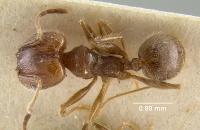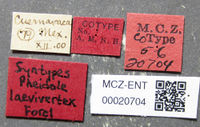Pheidole laevivertex
| Pheidole laevivertex | |
|---|---|

| |
| Scientific classification | |
| Kingdom: | Animalia |
| Phylum: | Arthropoda |
| Class: | Insecta |
| Order: | Hymenoptera |
| Family: | Formicidae |
| Subfamily: | Myrmicinae |
| Tribe: | Attini |
| Genus: | Pheidole |
| Species: | P. laevivertex |
| Binomial name | |
| Pheidole laevivertex Forel, 1901 | |
Nothing is known about the biology of laevivertex.
Identification
See the description in the nomenclature section.
Keys including this Species
Distribution
Known only from Aguascalientes and Morelos, Mexico. (Wilson 2003)
Latitudinal Distribution Pattern
Latitudinal Range: 20.2072° to 18.445416°.
| North Temperate |
North Subtropical |
Tropical | South Subtropical |
South Temperate |
- Source: AntMaps
Distribution based on Regional Taxon Lists
Neotropical Region: Mexico (type locality).
Distribution based on AntMaps
Distribution based on AntWeb specimens
Check data from AntWeb
Countries Occupied
| Number of countries occupied by this species based on AntWiki Regional Taxon Lists. In general, fewer countries occupied indicates a narrower range, while more countries indicates a more widespread species. |

|
Estimated Abundance
| Relative abundance based on number of AntMaps records per species (this species within the purple bar). Fewer records (to the left) indicates a less abundant/encountered species while more records (to the right) indicates more abundant/encountered species. |

|
Biology
Castes
Nomenclature
The following information is derived from Barry Bolton's Online Catalogue of the Ants of the World.
- laevivertex. Pheidole laevivertex Forel, 1901c: 131 (s.w.) MEXICO. See also: Wilson, 2003: 312.
Unless otherwise noted the text for the remainder of this section is reported from the publication that includes the original description.
Description
From Wilson (2003): A member of the fallax group similar in various characters to Pheidole chiapasana, Pheidole dentata, Pheidole humeridens, Pheidole industa, Pheidole madrensis, Pheidole maja and Pheidole tetroides, and distinguished as follows.
Major: rugoreticulum confined to a small patch just posterior to the circular carinulae of the antennal fossae; carinulae of head reaching slightly posterior to midway between the eyes and occiput; anterior half of pronotal dorsum and all of propodeal dorsum transversely carinulate; pronotal profile in dorsal-oblique view bilobous; postpetiole from above oval, and foveolate.
Minor: all of head, mesosoma, and waist foveolate and opaque; anterior strip of first gastral tergite shagreened; occiput in frontal view concave.
MEASUREMENTS (mm) Syntype major: HW 1.14, HL 1.22, SL 0.82, EL 0.20, PW 0.60. Syntype minor: HW 0.60, HL 0.70, SL 0.78, EL 0.14, PW 0.40.
COLOR Major: concolorous medium reddish brown.
Minor: body and scapes dark reddish brown, rest of appendages brownish yellow.
Figure. Upper: syntype, major. Lower: syntype, minor. MEXICO: Cuernavaca, Morelos, col. W. M. Wheeler. I have compared the specimens on which the drawing is based, which are located in the Museum of Comparative Zoology, Harvard, with syntypes in the Forel collection from the type locality. Scale bars = 1 mm.
Type Material
MEXICO: Aguascalientes, Aguascalientes. Musee National d'Histoire Naturelle and Museum of Comparative Zoology - as reported in Wilson (2003)
Etymology
L laevivertex, smooth top, referring to occiput. (Wilson 2003)
References
- Wilson, E. O. 2003. Pheidole in the New World: A dominant, hyperdiverse ant genus. Harvard University Press, Cambridge, MA. (page 312, fig. major, minor described)
- Forel, A. 1901d. I. Fourmis mexicaines récoltées par M. le professeur W.-M. Wheeler. II. A propos de la classification des fourmis. Ann. Soc. Entomol. Belg. 45: 123-141 (page 131, soldier, worker described)
- Varela-Hernández, F., Medel-Zosayas, B., Martínez-Luque, E.O., Jones, R.W., De la Mora, A. 2020. Biodiversity in central Mexico: Assessment of ants in a convergent region. Southwestern Entomologist 454: 673-686.
- Vázquez-Franco, C.M., Morrone, J.J. 2022. The genus Pheidole (Hymenoptera: Formicidae: Myrmicinae) in Puebla, Mexico. Revista Mexicana de Biodiversidad 93: e933820 (doi:10.22201/ib.20078706e.2022.93.3820).
References based on Global Ant Biodiversity Informatics
- Dattilo W. et al. 2019. MEXICO ANTS: incidence and abundance along the Nearctic-Neotropical interface. Ecology https://doi.org/10.1002/ecy.2944
- Fernandes, P.R. XXXX. Los hormigas del suelo en Mexico: Diversidad, distribucion e importancia (Hymenoptera: Formicidae).
- Kempf, W.W. 1972. Catalago abreviado das formigas da regiao Neotropical (Hym. Formicidae) Studia Entomologica 15(1-4).
- Vasquez Bolanos M., and J. Escoto Rocha. 2018. Ants (Hymenoptera: Formicidae) of Aguascalientes. Investigacion y Ciencia 24(68): 36-40.
- Vasquez-Bolanos M. 2011. Checklist of the ants (Hymenoptera: Formicidae) from Mexico. Dugesiana 18(1): 95-133.
- Vásquez-Bolaños M. 2011. Lista de especies de hormigas (Hymenoptera: Formicidae) para México. Dugesiana 18: 95-133
- Wilson, E.O. 2003. Pheidole in the New World: A Dominant, Hyperdiverse Genus. Harvard University Press



